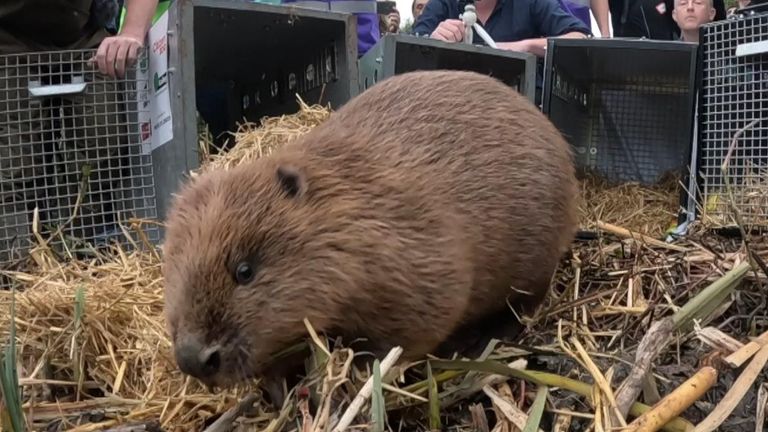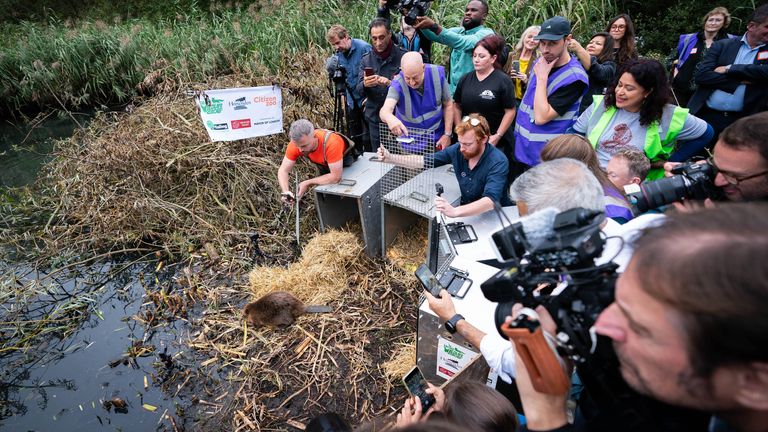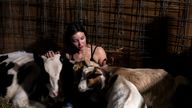Urban beavers reintroduced to London after 400 years
The five beavers brought down from Scotland from an established population are an adult pair, their juvenile daughter and two new kits.
Wednesday 11 October 2023 20:49, UK
In an industrial corner of west London this morning there was a scene not witnessed for at least 400 years - a family of beavers starting to make themselves at home.
Their wooded pond in Perivale has changed a bit since beavers were hunted to extinction in Elizabethan times.
It's just a few hundred yards from a 24-hour McDonald's and surrounded by the sound of lorries thundering along the A404.
But it didn't seem to faze the long-absent semi-aquatic mammals as they nosed their way around their new habitat.
And that's what makes this reintroduction - a partnership between a number of local environment groups, the Beaver Trust and Ealing Council - a significant one.
It's the first in a properly urban setting.
"We're excited to show they can have benefits in the urban landscape, not only for wildlife but for people too," said Dr Sean McCormack, chair of the Ealing Wildlife Group.
The beavers are an adult pair, their juvenile daughter and two new - also female - kits.
'ASBO beavers'
They've been brought down from Scotland from an established population in Tayside. They are what are known as "ASBO beavers" - removed from their home in Scotland because they were forcing part of a farmer's field to flood.
One of the main arguments for their reintroduction is their role as "ecosystem engineers".
Beavers' appetite for woody food in the winter naturally coppices trees improving biodiversity and their dambuilding behaviour has been shown to retain rainfall and alleviate flooding.
"Over the coming years they should provide effective nature-based solutions to urban problems such as flood mitigation and improved water quality," Dr McCormack added.
Indeed, the Costams Brook that flows through the beavers' new habitat regularly floods the nearby junction and shopping centre.
But once the journalists filming their release move away and they're left to explore their new home in peace, the "Ealing 5" will find they're not really free.
A 1.8km (1.1 mile) metal fence surrounds their new habitat - much to the frustration of wildlife experts.
Read more:
Cheap malaria vaccine approved for global rollout
September's temperature data was 'unprecedented' - and researchers are baffled at why extremes are so high
Freeing beavers 'not a priority'
The government completed a consultation on allowing beavers to be released properly into the wild two years ago.
However, the current government has stated freeing beavers is "not a priority".
This has only added to concerns that a wider commitment to restore biodiversity in 30% of UK habitats by 2030 isn't being taken seriously.
One amplified by the recent State of Nature report concluding, once again, the UK is one of the most nature-depleted places in Europe.
Campaign groups argue restoring habitats is about the lowest-cost way to help meet ambitious net zero targets and address increasing flooding risk as the climate warms. Even more low-cost if animals like beavers will do that work for free.
But when it comes to wildlife policies the government has been effectively, "treading water for over a year", according to Alastair Driver, director of Rewilding Britain, "nothing's happening, nothing substantial, [they] won't even talk, [they] won't even have a conversation about what might be possible."
Defra reject that claim. A spokesman said: "We published a plan to deliver our environmental goals in January through the Environmental Improvement Plan, and will set out our progress on 30 by 30 as promised by the end of the year."
And so far the Labour Party hasn't clearly laid out what plans it would have for wildlife if elected.
But local projects like the one in Ealing show progress is happening anyway according to Mr Driver. And even shows how beavers can be managed.
Provided they can learn some street smarts in their new urban home - their relocation could prove how beavers might properly be returned to the wild in an England that's very different to the one they once lived in.






